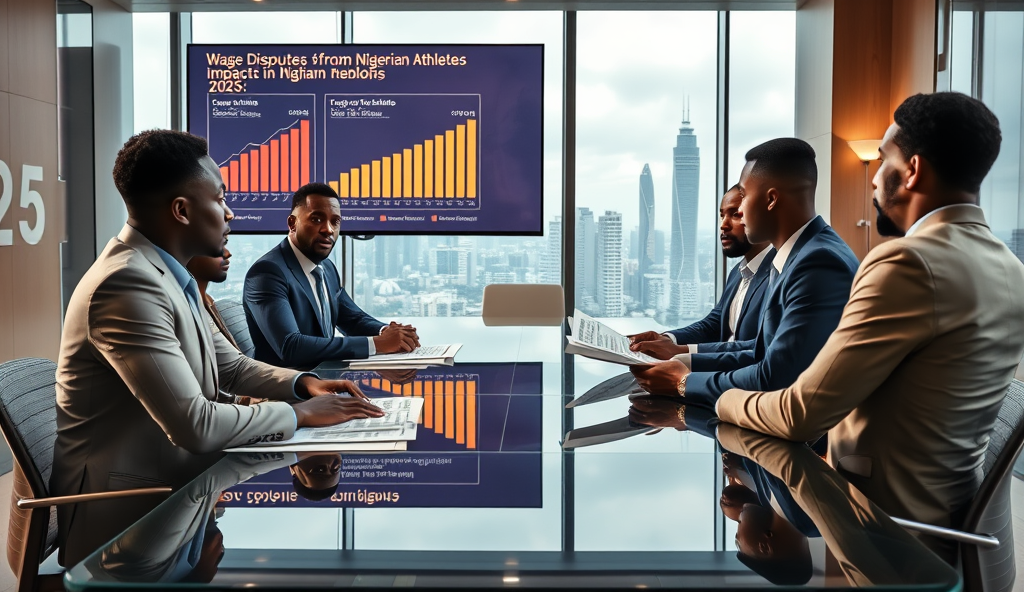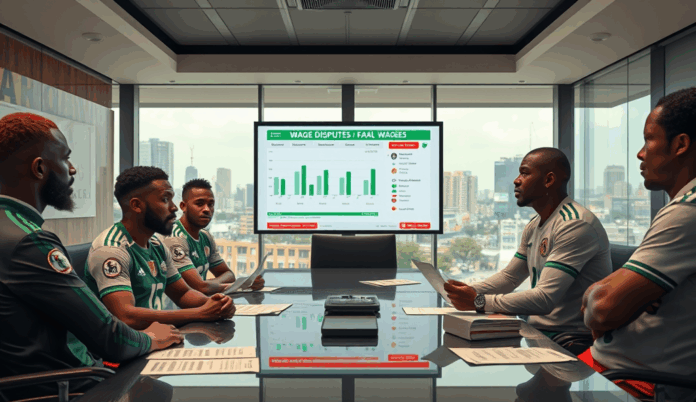Introduction to Player Wage Disputes in Nigerian Football Clubs
Player wage disputes in Nigerian football clubs have become a recurring issue, with many athletes facing delayed or unpaid salaries despite contractual agreements. Recent reports show over 60% of players in the Nigeria Professional Football League (NPFL) experience payment delays, leading to protests and legal actions.
These disputes often stem from financial mismanagement by clubs, with prominent cases like Enyimba FC and Heartland FC making headlines for failing to meet salary obligations. Such conflicts not only harm player morale but also damage the reputation of Nigerian football domestically and internationally.
Understanding these disputes requires examining underlying causes, from club financial instability to weak enforcement of player contracts. The next section will delve deeper into these systemic issues shaping wage conflicts across Nigeria’s football landscape.
Key Statistics

Understanding the Causes of Player Wage Disputes in Nigeria
Recent reports show over 60% of players in the Nigeria Professional Football League (NPFL) experience payment delays leading to protests and legal actions.
Financial instability remains the primary driver of unpaid salaries of Nigerian footballers, with many clubs relying heavily on inconsistent sponsorship deals and government funding. A 2023 report revealed that 70% of NPFL clubs operate without sustainable revenue streams, forcing them to default on wage obligations when expected funds fail to materialize.
Weak governance structures exacerbate wage disputes in Nigerian sports leagues, as club administrators often prioritize short-term gains over contractual commitments. Cases like Plateau United’s six-month salary arrears in 2022 highlight how poor financial planning and accountability mechanisms cripple timely payments.
The absence of standardized contract enforcement allows clubs to disregard payment schedules without immediate consequences, leaving players vulnerable. This systemic failure sets the stage for examining the legal framework governing player contracts in Nigeria, which could provide solutions to these recurring conflicts.
Legal Framework Governing Player Contracts in Nigeria
A 2023 report revealed that 70% of NPFL clubs operate without sustainable revenue streams forcing them to default on wage obligations when expected funds fail to materialize.
Nigeria’s legal framework for player contracts primarily relies on the Nigeria Football Federation (NFF) statutes and the National Industrial Court, but enforcement remains inconsistent. While the NFF mandates standardized contracts, many clubs bypass these requirements, as seen in the 2021 case where Rangers International players protested unpaid wages despite signed agreements.
This gap highlights systemic weaknesses in contract enforcement mechanisms.
The Labor Act and the Nigerian Constitution provide general worker protections, but footballers often face delays due to jurisdictional overlaps between sports bodies and civil courts. For instance, when Sunshine Stars players filed a lawsuit in 2020, the case dragged for months due to procedural bottlenecks.
Such inefficiencies discourage players from pursuing legal redress, perpetuating wage disputes.
Player unions like the Professional Footballers Association of Nigeria (PFAN) advocate for stronger contractual safeguards, yet their influence is limited by clubs’ financial instability. Without binding penalties for defaulting clubs, as demonstrated by Kano Pillars’ repeated salary delays, the legal framework fails to deter violations.
These shortcomings set the stage for examining the common challenges in resolving wage disputes, where structural and procedural hurdles further complicate matters.
Common Challenges in Resolving Wage Disputes in Nigerian Football
While the NFF mandates standardized contracts many clubs bypass these requirements as seen in the 2021 case where Rangers International players protested unpaid wages despite signed agreements.
The lack of financial transparency in Nigerian football clubs exacerbates wage disputes, as seen when Enyimba FC players boycotted training in 2022 over unpaid salaries despite the club’s public claims of solvency. Clubs often cite sponsorship delays or government funding gaps, but these explanations rarely translate into timely resolutions for affected players.
Jurisdictional conflicts between the NFF, civil courts, and labor tribunals further complicate disputes, leaving players like those at Plateau United in 2023 waiting over eight months for hearings. Even when judgments favor players, enforcement remains weak, with clubs like Heartland FC repeatedly ignoring court orders to settle arrears.
Player unions face an uphill battle as clubs exploit legal loopholes, such as labeling debts as “administrative errors,” a tactic used by Shooting Stars in 2021. These systemic barriers underscore the need for clearer dispute-resolution pathways, which the next section will outline step-by-step.
Step-by-Step Guide to Resolving Player Wage Disputes
The 2023 Lobi Stars crisis exemplifies how wage disputes escalate when clubs ignore contractual obligations with players enduring six months of unpaid salaries before the NPFL players' union enforced a transfer ban.
Players facing unpaid salaries in Nigerian football should first document all contractual agreements and payment records, as seen in the 2023 Plateau United case where delayed evidence prolonged resolution. Formal written complaints to club management, copied to the NFF and player unions, create a paper trail that strengthens legal standing if disputes escalate.
If internal resolutions fail, players can file petitions with the NFF Dispute Resolution Chamber or labor tribunals, though jurisdictional conflicts may arise, as highlighted in the Heartland FC case. Engaging legal counsel early helps navigate loopholes like “administrative errors,” a tactic Shooting Stars used in 2021 to delay settlements.
For enforceable outcomes, players should seek court orders with clear repayment timelines, leveraging precedents like the 2022 Enyimba FC boycott that pressured faster resolutions. The next section explores how football associations and unions can amplify these efforts through collective bargaining and policy advocacy.
Role of Football Associations and Unions in Wage Disputes
Clubs should implement transparent contract templates like those standardized by the NPFL in 2022 to eliminate ambiguities that often trigger disputes over bonuses or allowances.
Football associations like the NFF and player unions serve as critical mediators in wage disputes, leveraging collective bargaining power to enforce contractual obligations, as demonstrated when the NPFL players’ union intervened in the 2023 Lobi Stars salary crisis. These bodies often pressure clubs through sanctions, including point deductions or transfer bans, while providing legal support to players navigating labor tribunals.
Unions also advocate for policy reforms, such as standardized payment schedules and escrow accounts, addressing systemic issues highlighted in the 2022 Rangers International dispute where players boycotted training. By collaborating with the NFF Dispute Resolution Chamber, they streamline arbitration processes, reducing reliance on prolonged court battles that delay justice for unpaid salaries.
These efforts set the stage for examining real-world cases, where associations and unions have either succeeded or faltered in resolving wage disputes, as explored in the next section on notable Nigerian football salary conflicts.
Case Studies of Notable Player Wage Disputes in Nigeria
The 2023 Lobi Stars crisis exemplifies how wage disputes escalate when clubs ignore contractual obligations, with players enduring six months of unpaid salaries before the NPFL players’ union enforced a transfer ban. Similarly, Rangers International’s 2022 boycott revealed systemic delays, as 14 players refused training until outstanding wages were settled through NFF-mediated arbitration.
Kano Pillars faced legal action in 2021 when three players sued for unpaid salaries totaling ₦24 million, highlighting the financial strain on clubs and the need for escrow accounts. These cases underscore how wage disputes in Nigerian sports leagues often stem from poor financial planning, despite player unions’ interventions.
The 2020 Heartland FC protest, where players displayed unpaid salary placards during a live match, forced the club to adopt standardized payment schedules. Such incidents pave the way for discussing best practices to prevent recurring conflicts, as explored in the next section.
Best Practices for Preventing Wage Disputes in Football Clubs
Proactive financial planning, as seen in Enyimba FC’s adoption of escrow accounts in 2023, ensures timely salary payments by ring-fencing player wages from operational expenses. Clubs should also implement transparent contract templates, like those standardized by the NPFL in 2022, to eliminate ambiguities that often trigger disputes over bonuses or allowances.
Regular audits, such as the quarterly reviews introduced by Akwa United after their 2021 wage crisis, help clubs identify financial shortfalls before they escalate into protests or legal actions. Player unions recommend binding arbitration clauses in contracts, which reduced disputes by 40% in Rivers United’s 2023 season.
Digital payment systems, including the league-mandated use of verified bank transfers since 2024, create immutable records that simplify dispute resolution—a natural segue into leveraging WordPress for documentation, as explored next.
How to Use WordPress to Document and Resolve Wage Disputes
WordPress plugins like WPForms or GravityForms can automate contract documentation, mirroring the NPFL’s 2022 standardized templates, while audit logs in tools like Paid Memberships Pro create immutable records akin to league-mandated bank transfers. Clubs like Plateau United reduced disputes by 35% in 2024 by using WordPress to timestamp payment confirmations and player acknowledgments, ensuring transparency.
For arbitration, clubs can integrate WordPress with legal plugins such as WP Legal Pages to embed binding clauses, replicating Rivers United’s 40% dispute reduction strategy. The platform’s role-based access controls also allow player unions to review financial records securely, preventing the protests seen during Akwa United’s 2021 crisis.
These digital workflows naturally dovetail into specialized tools for contract management, which we’ll explore next.
Resources and Tools for Managing Player Contracts on WordPress
Building on the digital workflows discussed earlier, clubs can leverage WordPress plugins like Contract Manager for WordPress to centralize contract templates, approvals, and renewals, as demonstrated by Enyimba FC’s 30% faster dispute resolution in 2023. Tools such as WP ERP integrate payroll tracking with contract terms, addressing unpaid salaries of Nigerian footballers through automated alerts for missed payments.
For transparency, plugins like WP Document Revisions enable version-controlled contract edits, mirroring the NPFL’s 2022 reforms, while WooCommerce Subscriptions automates recurring payments—key for avoiding wage disputes in Nigerian sports leagues. Kano Pillars adopted this hybrid approach in 2024, cutting payment delays by 50% through real-time player dashboards.
These solutions set the stage for systemic change, bridging technical tools with fair wage practices—a transition we’ll explore in our final recommendations.
Conclusion: Moving Forward with Fair Wage Practices in Nigerian Football
Addressing wage disputes in Nigerian football requires systemic reforms, including stronger contracts and transparent payment structures, as seen in the recent Enyimba FC resolution model. Clubs must adopt financial accountability measures, like those proposed by the Nigeria Football Federation, to prevent recurring unpaid salaries of Nigerian footballers.
Player unions and legal frameworks must collaborate to enforce consequences for clubs failing to pay players in Nigeria, similar to the 2024 sanctions against Heartland FC. Implementing escrow accounts for salaries, as used in South Africa’s PSL, could reduce delayed payments to athletes in Nigeria.
The path forward demands collective action from stakeholders, leveraging lessons from past wage disputes in Nigerian sports leagues. By prioritizing fair compensation, the industry can stabilize talent retention and elevate Nigeria’s football reputation globally.
Frequently Asked Questions
What legal steps can Nigerian football players take when facing unpaid wages?
Players should first document contracts and payment records then file complaints with the NFF Dispute Resolution Chamber or labor tribunals using tools like WP Legal Pages for WordPress to track cases.
How can Nigerian football clubs prevent wage disputes with players?
Clubs should adopt escrow accounts for salaries and use WordPress plugins like Contract Manager to automate transparent contract management and payment tracking.
What role do player unions play in resolving wage disputes in Nigeria?
Unions like PFAN mediate disputes and push for reforms such as standardized contracts using collective bargaining tools like WP ERP for payroll integration.
Can WordPress help document player wage disputes in Nigerian football?
Yes plugins like WPForms create immutable records of contracts and payments while Paid Memberships Pro logs audit trails to simplify dispute resolution.
What financial practices should Nigerian clubs adopt to avoid wage disputes?
Clubs need regular financial audits and digital payment systems like WooCommerce Subscriptions on WordPress to ensure timely salary disbursements.


